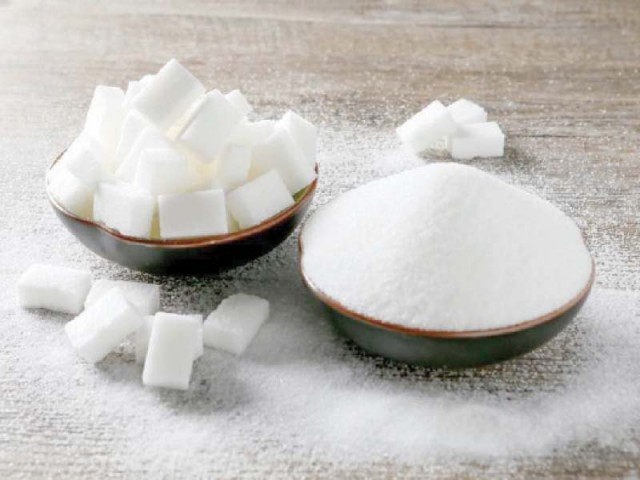
Sugar price remains at high levels
by Salman SiddiquiKARACHI: The Pakistan Tehreek-e-Insaf (PTI) government took strict notice of an unnecessary surge in the sugar price. It investigated, conducted a forensic audit of sugar mills and questioned the sitting ministers but this all went into vain as far as end-consumers were concerned.
The price of the sweetener still stays high at Rs80-84 per kg in the retail market in Karachi.
“Sugar price rose to its peak at Rs78 per kg (at Jodia Bazaar, the country’s biggest wholesale market) before Eid holidays (May 22-27),” Karachi Wholesale Grocers Association (KWGA) Chairman Malik Zulfiqar Ali said while talking to The Express Tribune.
The sugar price has remained at around current levels for the past couple of months and this comes at a time when sugarcane harvesting and sugar production (January-April) are going on.
At the same time, the demand for the commodity has dropped due to low consumption by the largest consumers – confectionery makers – under the lockdown since the end of March.
Apart from that, the Economic Coordination Committee (ECC) of the cabinet suspended the export of 350,000 tons of sugar in February and emphasised that the available stock of 1.719 million tons was sufficient to meet domestic demand.
Earlier, the ECC had allowed export of 1.1 million tons of sugar in December 2018.
The export has remained suspended since January, according to Pakistan Bureau of Statistics (PBS).
“The price of the commodity in Punjab and other parts of the country is always higher as compared to Karachi as the city of ports has the country’s largest wholesale market – Jodia Bazaar,” Ali said.
Furthermore, a forensic report suggested that sugar mills reported an exaggerated volume of exports to get subsidy and reported lower sugar production.
“The quantity of sugar produced seems to be sufficient for annual national consumption,” found an inquiry committee of the Federal Investigation Agency (FIA).
It added the retail price increased from Rs55 per kg in the retail market in December 2018 to Rs74.64 per kg in January 2020 and the major increase was made much before the start of the new crushing season.
The FIA report appeared in the first week of April when a majority of the confectionery manufacturers, which consume over 70% of the total sugar production in the country, were closed due to the lockdown.
The sugar scandal suggests the mill owners have got a windfall of around Rs100 billion, which the end-consumers paid.
The FIA and forensic reports held the PTI government responsible for the price hike as it allowed exports despite a production shortfall in previous years and also provided subsidy on exports to sugar mill owners, who were already making money from continued price hike.
The United States Department of Agriculture (USDA), in its report in April 2019, said in Pakistan’s marketing year 2019-20 sugar production was forecast at 5.2 million tons, a 5% decrease from the current year’s revised estimate, as delays in cane payments and reduced expectations surrounding the support price was prompting some farmers to switch to other crops such as cotton and corn.
Sugar consumption for the same year was forecast at 5.6 million tons, slightly higher than previous year’s estimates, and exports were forecast at 500,000 tons.
“Ending stocks are expected to decrease to seven-year lows mainly due to decreased production. The current year’s production estimates are revised down 24% from last year mainly due to the delayed start of the crushing season,” the USDA said.
Sugar production for marketing year 2017-18 was revised down to 7.2 million tons based on grinding volume and sucrose contents. Marketing year 2017-18 sugar exports stood at 1.6 million tons mainly due to a subsidy of $97 per ton provided to sugar exporters, it said.
“Since last year, sugarcane area and production are on a decreasing trend mainly due to farmers’ discontent in not receiving procurement prices and delayed payments for their produce,” it said.
Published in The Express Tribune, May 27th, 2020.